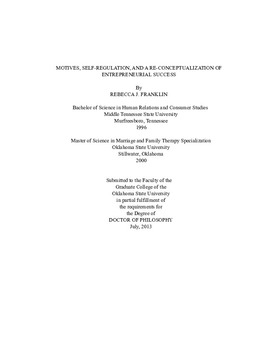| dc.contributor.advisor | Baron, Robert A. | |
| dc.contributor.author | Franklin, Rebecca J. | |
| dc.date.accessioned | 2014-09-24T14:16:56Z | |
| dc.date.available | 2014-09-24T14:16:56Z | |
| dc.date.issued | 2013-07 | |
| dc.identifier.uri | https://hdl.handle.net/11244/11017 | |
| dc.description.abstract | This study examines the role of intrinsic motives and self-regulatory factors on entrepreneurs' goal progress, career success, and subjective well-being. A review of the literature on entrepreneurial motives found that not only do entrepreneurs have a broad range of motives for starting a business, they tend to emphasize intrinsic motives above financial motives. This indicates the need to re-conceptualize entrepreneurial success to include dimensions beyond the financial measures typically used to measure entrepreneurial success, such as subjective career success and global life satisfaction/subjective well-being. Structural equation modeling of survey responses from entrepreneurs indicated that self-control was positively related to goal progress, and goal progress fully mediated the positive relationship between self-control and career success. Locomotion was positively related to goal progress and career success, and goal progress partially mediated the relationship between locomotion and career success. Career success fully mediated the relationship between goal progress and subjective well-being. Locomotion fully mediated the positive relationship between intrinsic motives and goal progress. Results suggest that intrinsic motives alone are not adequate for goal progress and career success -- high levels of locomotion are also necessary. This finding contributes to self-determination theory by identifying why some individuals fail to act regardless of having high levels of intrinsic motivation. Additionally, self-control, which contributes to higher levels of goal progress, is a self-regulatory skill that can be learned. Practical implications suggest that helping entrepreneurs increase their self-regulatory skills can enhance their subjective and objective success, leading to better performance and higher levels of subjective-well being. | |
| dc.format | application/pdf | |
| dc.language | en_US | |
| dc.rights | Copyright is held by the author who has granted the Oklahoma State University Library the non-exclusive right to share this material in its institutional repository. Contact Digital Library Services at lib-dls@okstate.edu or 405-744-9161 for the permission policy on the use, reproduction or distribution of this material. | |
| dc.title | Motives, self-regulation, and a re-conceptualization of entrepreneurial success | |
| dc.contributor.committeeMember | Barringer, Bruce R. | |
| dc.contributor.committeeMember | Mueller, Brandon A. | |
| dc.contributor.committeeMember | Burkley, Edward Loren | |
| osu.filename | Franklin_okstate_0664D_12845.pdf | |
| osu.accesstype | Open Access | |
| dc.type.genre | Dissertation | |
| dc.type.material | Text | |
| thesis.degree.discipline | Entrepreneurship | |
| thesis.degree.grantor | Oklahoma State University | |
